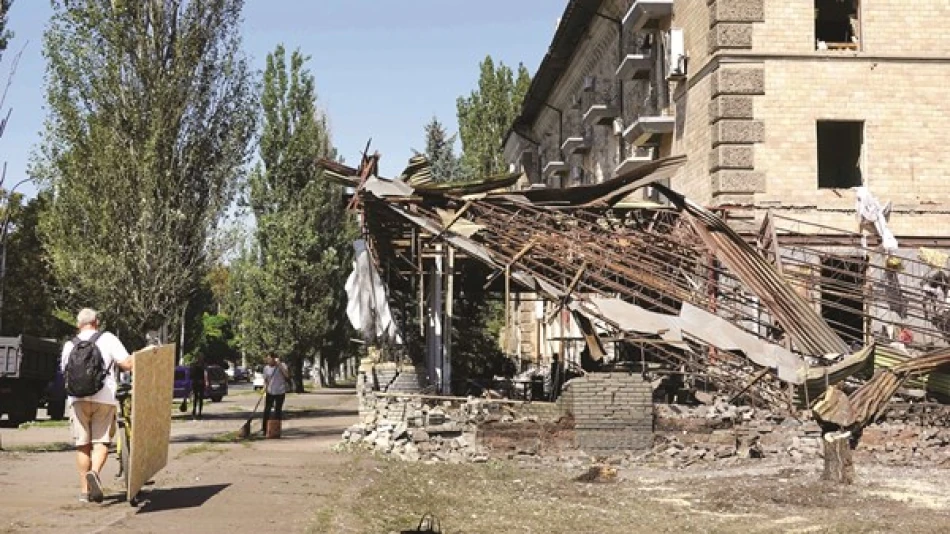
White House: Russian Strikes on Kyiv Jeopardize Trump's Peace Plan
Russia's Deadly Kyiv Strike Undermines Trump's Peace Mediation Before It Begins
A devastating Russian missile and drone assault on Kyiv killed 17 civilians, including four children, and damaged European Union and UK diplomatic missions, prompting sharp condemnation from Trump's special envoy to Ukraine who warned the attack threatens the new president's peace efforts. The strike represents Russia's calculated response to renewed diplomatic initiatives, signaling Moscow's intention to negotiate from a position of strength rather than compromise.
Diplomatic Fallout Spreads Across Western Capitals
Keith Kellogg, Trump's special envoy to Ukraine, took to X to denounce what he called "horrific attacks" that endanger the peace process the U.S. president seeks to achieve. The timing appears deliberate—coming as the Trump administration signals its intention to broker a swift resolution to the nearly three-year conflict.
The assault marked the most intense Russian bombardment of the Ukrainian capital since July, with forces launching hypersonic missiles, precision-guided munitions, and swarms of drones targeting what Moscow claimed were military command centers. Ukrainian air defenses intercepted 563 of 598 drones and 26 of 31 missiles, but the sheer volume overwhelmed defensive systems in some areas.
European Missions Caught in Crossfire
For the first time since the war began, the EU delegation building in Kyiv sustained damage, though staff remained unharmed. The strike on diplomatic facilities—whether intentional or collateral—sends a pointed message to Western supporters of Ukraine. European Commission President Ursula von der Leyen called for Russia to halt attacks on civilian infrastructure and engage in negotiations for "just and lasting peace."
Moscow's Strategic Messaging
Kremlin spokesman Dmitry Peskov delivered a carefully calibrated response, stating Russia remains "interested in continuing the negotiation process" while emphasizing that military operations will continue against "military targets and related facilities." This dual approach—escalation paired with diplomatic openness—reflects Russia's attempt to shape the terms of any future talks.
The messaging strategy mirrors tactics used throughout the conflict: demonstrate military capability while maintaining plausible diplomatic engagement. By targeting Kyiv's government quarter and diplomatic areas, Russia signals it can strike Ukraine's decision-making centers at will.
Trump's Peace Initiative Faces Early Test
The attack presents an immediate challenge to Trump's campaign promise to end the Ukraine war quickly. Unlike previous U.S. mediation efforts that focused on supporting Ukraine's position, Trump has suggested a more transactional approach that could involve territorial concessions.
Ukrainian President Volodymyr Zelensky framed the attack as Russia's answer to diplomacy, writing on X that "Russia chooses ballistic missiles instead of negotiations." This characterization aims to influence Trump's approach by portraying Russia as the obstacle to peace talks.
Historical Precedent Suggests Prolonged Conflict
Similar patterns emerged during previous diplomatic initiatives. Russia intensified military operations ahead of the Istanbul talks in March 2022 and during various ceasefire discussions, seeking to maximize leverage. The current escalation follows this playbook, suggesting Moscow believes it can extract better terms through military pressure.
The civilian casualties—38 wounded alongside the 17 killed—also serve Putin's broader strategy of testing Western resolve. Each attack forces Ukrainian allies to choose between escalating support or pushing for potentially unfavorable peace terms.
Market and Geopolitical Implications
Energy markets showed minimal reaction to the latest escalation, indicating investor confidence that the conflict remains geographically contained. However, defense contractors' stocks have maintained elevated valuations throughout the war, reflecting expectations of sustained military spending regardless of peace talks.
The attack's timing—early in Trump's presidency—suggests Russia aims to establish negotiating parameters before the new administration fully develops its Ukraine policy. This approach contrasts with Moscow's more confrontational stance toward the Biden administration, indicating Putin may see opportunity in Trump's deal-making reputation.
The fundamental question remains whether Trump's transactional approach can overcome Putin's apparent belief that time and military pressure favor Russia's position. The Kyiv strike suggests Moscow intends to test that assumption through continued escalation rather than immediate diplomatic engagement.
Most Viewed News

 Layla Al Mansoori
Layla Al Mansoori






